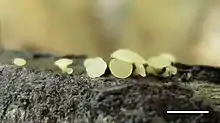Chlorovibrissea
Chlorovibrissea is a genus of six or more aquatic or semi-aquatic fungi in the family Vibrisseaceae.[1][2] Most species are found in Australasia[3] but C. chilensis, described as new to science in 2014, is from South America[4] and C. korfii is from China.[2]
| Chlorovibrissea | |
|---|---|
 | |
| Chlorovibrissea korfii in Yunnan province, China | |
| Scientific classification | |
| Kingdom: | |
| Division: | |
| Class: | |
| Order: | |
| Family: | |
| Genus: | Chlorovibrissea L.M.Kohn (1989) |
| Type species | |
| Chlorovibrissea bicolor (G.W.Beaton & Weste) L.M.Kohn (1989) | |
| Species | |
|
C. bicolor | |
References
- Kirk PM, Cannon PF, Minter DW, Stalpers JA (2008). Dictionary of the Fungi (10th ed.). Wallingford, UK: CAB International. p. 138. ISBN 978-0-85199-826-8.
- Zheng, HD; Zhuang, WY (2017). "Chlorovibrissea korfii sp. nov. from northern hemisphere and Vibrissea flavovirens new to China". MycoKeys. 26: 1–11. doi:10.3897/mycokeys.26.14506.
- Kohn LM. (1989). "Chlorvibrissea (Helotiales, Leotiaceae), a new genus of austral discomycetes". Memoirs of the New York Botanical Garden. 4: 112–18.
- Sandoval-Leiva P, Carmarán CC, Park D, Romero AI, Johnston PR (2014). "Vibrisseaceous fungi from the southern hemisphere, including Chlorovibrissea chilensis (Helotiales, incertae sedis) sp. nov". Mycologia. 106 (6): 1159–67. doi:10.3852/14-009. PMID 25152002.
This article is issued from Wikipedia. The text is licensed under Creative Commons - Attribution - Sharealike. Additional terms may apply for the media files.